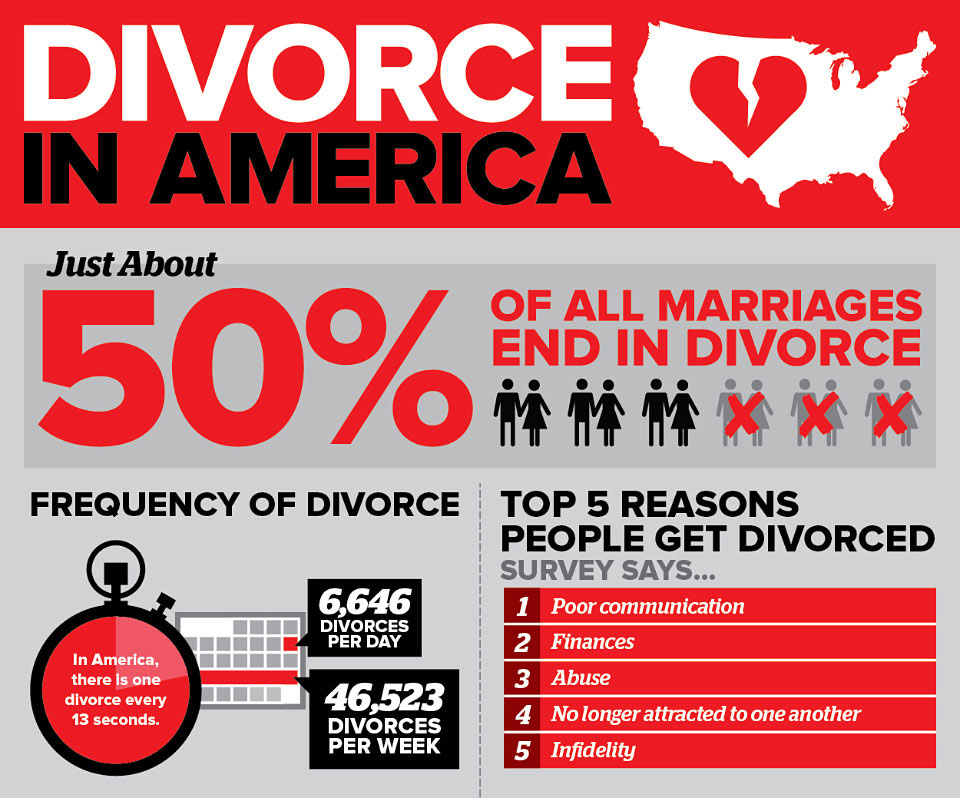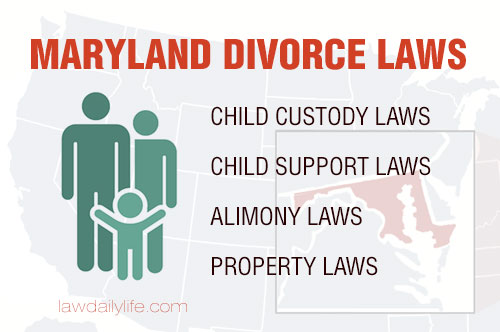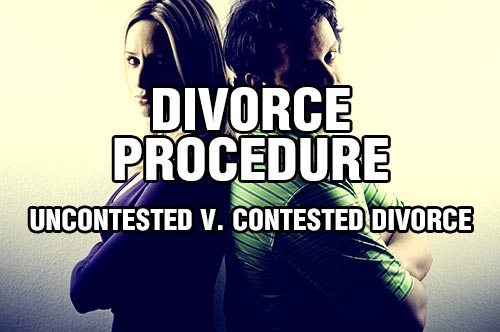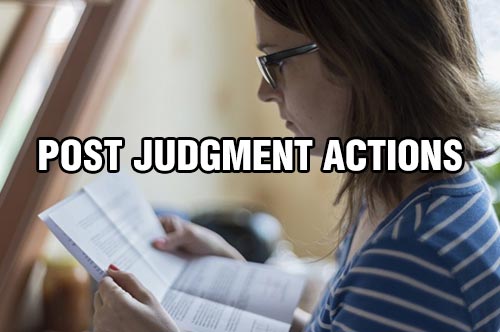The following is a summary of Maryland’s divorce laws. In some cases, the exact text of the statute has been simplified and/or modified to provide for easier understanding. For a more specific understanding of the laws, you should consult the full Maryland Code or ask an attorney how the law might apply to your particular situation.

Maryland Divorce Grounds
What to Expect When Help Yourself Divorce Prepares Your Maryland Divorce
Grounds for Divorce.
When Help Yourself Divorce prepares your divorce papers, your divorce will be filed on the grounds that you’ve been living separate and apart for 12 months.
Residency Requirements.
Maryland laws require at least one party to have resided in the state of Maryland for one year before the divorce papers are filed, if the grounds for divorce occurred outside the state. If the grounds for divorce occurred within the state of Maryland, there are no residency requirements but at least one spouse must be a resident of the state of Maryland.
Filing for Divorce.
The divorce papers may be filed in the Maryland county where either spouse resides.
Service.
After filing the divorce papers with the Court, you must “serve” your spouse with the papers. Service is made by having someone other than yourself, who is at least 18 years old, serve the papers upon your spouse. This can be done by Sheriff, process server, or 3rd party via certified mail, restricted delivery, return-receipt requested.
Waiting Period/Final Hearing.
There is no specified waiting period under Maryland laws before your final divorce hearing may be held. How long it takes to obtain a hearing will depend on the schedule of the court. Both spouses will typically be required to attend the final hearing.
Alimony Laws in Maryland
Alimony Agreement of the Parties.
The court is bound to the agreement made by the parties concerning alimony.
-From 11-101 of the Maryland Code.
Maryland Alimony Guidelines.
In making the determination for alimony, Maryland laws specify the following guidelines for the court to consider:
1. The ability of the party seeking alimony to be wholly or partly self-supporting;
2. The time necessary for the party seeking alimony to gain sufficient education or training to enable that party to find suitable employment;
3. The standard of living that the parties established during their marriage;
4. The duration of the marriage;
5. The contributions, monetary and non-monetary, of each party to the well-being of the family;
6. The circumstances that contributed to the estrangement of the parties;
7. The age of each party;
8. The physical and mental condition of each party;
9. The ability of the party from whom alimony is sought to meet that party’s needs while meeting the needs of the party seeking alimony;
10. Any agreement between the parties;
11. The financial needs and financial resources of each party, including
a. All income and assets, including property that does not produce income;
b. Any award of property made by the court;
c. The nature and amount of the financial obligations of each party; and
d. The right of each party to receive retirement benefits; and
12. Whether the award would cause a spouse who is a resident of a related institution as defined in § 19-301 of the Health-General Article and from whom alimony is sought to become eligible for medical assistance earlier than would otherwise occur.
-From 11-106 of the Maryland Code.
Permanent Alimony.
The court may order alimony for an indefinite time, if the court finds that due to age, illness, infirmity, or disability, the party seeking alimony cannot reasonably be expected to make substantial progress toward becoming self-supporting, or even after the party seeking alimony will have made as much progress toward becoming self-supporting as can reasonably be expected, the standards of living of the parties will be unconscionably disparate.
-From 11-106 of the Maryland Code.
Termination of Alimony.
Unless the parties agree otherwise, alimony terminates upon the death of either party, upon the remarriage of the recipient, or if the court finds that termination is necessary to avoid a harsh and inequitable result.
-From 11-108 of the Maryland Code.
Maryland Child Custody Laws
Maryland law lists no specific guidelines or factors the court uses to determine child custody. If there has been abuse or child neglect, the court might deny custody or visitation to the parent who committed the offense.
Unless otherwise ordered by a court, the law prohibits access to medical, dental, and educational records concerning the child from being denied to a parent because the parent does not have physical custody of the child. (9-104)
Maryland Child Support Laws
Determination of Income.
“Income” means actual income from any source, including salaries; wages; commissions; bonuses; dividend income; pension income; interest income; trust income; annuity income; Social Security benefits; workers’ compensation benefits; unemployment insurance benefits; disability insurance benefits; for the obligor, any third party payment paid to or for a minor child as a result of the obligor’s disability, retirement, or other compensable claim; alimony or maintenance received; and expense reimbursements or in-kind payments received by a parent in the course of employment, self-employment, or operation of a business to the extent the reimbursements or payments reduce the parent’s personal living expenses. Based on the circumstances of the case, the court may consider the following items as actual income: severance pay; capital gains; gifts; or prizes.
For income from self-employment, rent, royalties, proprietorship of a business, or joint ownership of a partnership or closely held corporation, “actual income” means gross receipts minus ordinary and necessary expenses required to produce income. “Ordinary and necessary expenses” does not include amounts allowable by the Internal Revenue Service for the accelerated component of depreciation expenses or investment tax credits or any other business expenses determined by the court to be inappropriate for determining actual income for purposes of calculating child support.
“Actual income” does not include benefits received from means-tested public assistance programs, including temporary cash assistance, Supplemental Security Income, food stamps, and transitional emergency, medical, and housing assistance.
If a parent is voluntarily impoverished, child support may be calculated based on a determination of potential income. However, a determination of potential income may not be made for a parent who is unable to work because of a physical or mental disability; or is caring for a child under the age of two years for whom the parents are jointly and severally responsible. “Potential income” means income attributed to a parent determined by the parent’s employment potential and probable earnings level based on, but not limited to, recent work history, occupational qualifications, prevailing job opportunities, and earnings levels in the community.
-From Sections §12-201 and §12-204 of the Maryland Code.
Determination of Child Support Obligation.
The basic child support obligation shall be determined in accordance with the schedule of basic child support obligations in Section §12-204 of the Maryland Code. The basic child support obligation shall be divided between the parents in proportion to their adjusted actual incomes. “Adjusted actual income” means actual income minus preexisting reasonable child support obligations actually paid; except as provided in §12-204 (a) (2), alimony or maintenance obligations actually paid; and the actual cost of providing health insurance coverage for a child for whom the parents are jointly and severally responsible.
-From Sections §12-201 and §12-204 of the Maryland Code.
Calculating Support for Shared Physical Custody.
“Shared physical custody” means that each parent keeps the child or children overnight for more than 35% of the year and that both parents contribute to the expenses of the child or children in addition to the payment of child support. In cases of shared physical custody, the adjusted basic child support obligation shall first be divided between the parents in proportion to their respective adjusted actual incomes, then each parent’s share shall be multiplied by the percentage of time the children spend with the other parent to determine the theoretical basic child support obligation owed to the other parent. The parent owing the greater amount shall owe the difference in the two amounts as child support.
-From Section §12-204 of the Maryland Code.
Additional Expenses.
Actual child care expenses incurred on behalf of a child due to employment or job search of either parent shall be added to the basic obligation and shall be divided between the parents in proportion to their adjusted actual incomes
Any extraordinary medical expenses incurred on behalf of a child shall be added to the basic child support obligation and shall be divided between the parents in proportion to their adjusted actual incomes. “Extraordinary medical expenses” means uninsured expenses over $100 for a single illness or condition, and includes uninsured, reasonable, and necessary costs for orthodontia, dental treatment, asthma treatment, physical therapy, treatment for any chronic health problem, and professional counseling or psychiatric therapy for diagnosed mental disorders.
By agreement of the parties or by order of court, the following expenses incurred on behalf of a child may be divided between the parents in proportion to their adjusted actual incomes:
(1) any expenses or attending a special or private elementary or secondary school to meet the particular educational needs of the child; or
(2) any expenses for transportation of the child between the homes of he parents.
-From Section §12-204 of the Maryland Code.
Deviation from Child Support Guidelines.
There is a rebuttable presumption that the amount of child support which would result from the application of the child support guidelines set forth in this subtitle is the correct amount of child support to be awarded. The presumption may be rebutted by evidence that the application of the guidelines would be unjust or inappropriate in a particular case. In determining whether the application of the guidelines would be unjust or inappropriate in a particular case, the court may consider:
1. the terms of any existing separation or property settlement agreement or court order, including any provisions for payment of mortgages or marital debts, payment of college education expenses, the terms of any use and possession order or right to occupy to the family home under an agreement, any direct payments made for the benefit of the children required by agreement or order, or any other financial considerations set out in an existing separation or property settlement agreement or court order; and
2. the presence in the household of either parent of other children to whom that parent owes a duty of support and the expenses for whom that parent is directly contributing.
-From Section §12-202 of the Maryland Code.
Maryland Property Division Laws
What is Considered Marital or Non Marital Property.
(8-201)(e)
“Marital property” means the property, however titled, acquired by one or both parties during the marriage, including any interest in real property held by the parties as tenants by the entirety unless the real property is excluded by valid agreement. Marital property does not include property:
1. Acquired before the marriage;
2. Acquired by inheritance or gift from a third party;
3. Excluded by valid agreement; or
4. Directly traceable to any of these sources.
Retirement Plans.
(8-205)
The court may transfer ownership of an interest in a pension, retirement, profit sharing, or deferred compensation plan from one party to either or both parties, grant a monetary award, or both, in order to make the property settlement fair and equitable. The court shall make this determination based on the following guidelines:
1. The contributions, monetary and non-monetary, of each party to the well-being of the family;
2. The value of all property interests of each party;
3. The economic circumstances of each party at the time the award is to be made;
4. The circumstances that contributed to the estrangement of the parties;
5. The duration of the marriage;
6. The age of each party;
7. The physical and mental condition of each party;
8. How and when specific marital property or interest in the pension, retirement, profit sharing, or deferred compensation plan, was acquired, including the effort expended by each party in accumulating the marital property or the interest in the pension, retirement, profit sharing, or deferred compensation plan, or both
9. The contribution by either party of non-marital property, described above, to the acquisition of real property held by the parties as tenants by the entirety;
10. Any award of alimony and any award or other provision that the court has made with respect to family use personal property or the family home; and
11. Any other factor that the court considers necessary or appropriate to consider in order to arrive at a fair and equitable monetary award or transfer of an interest in the pension, retirement, profit sharing, or deferred compensation plan, or both.
Occupancy and Use of the Family Home.
The court shall enable any child of the family to continue to live in the environment and community that are familiar to the child, and shall provide for the continued occupancy of the family home and possession and use of family property by a party with custody of a child who has a need to live in that home.
(8-208)(b)
In awarding the possession and use of the family home and family property, the court shall consider each of the following factors:
1. The best interest of the child;
2. The interest of each party in continuing to use the family personal property or to occupy or use the family home, either as a personal dwelling or for the production of income; and
3. Any hardship imposed on the party whose interest in the family home or family property is infringed on.










